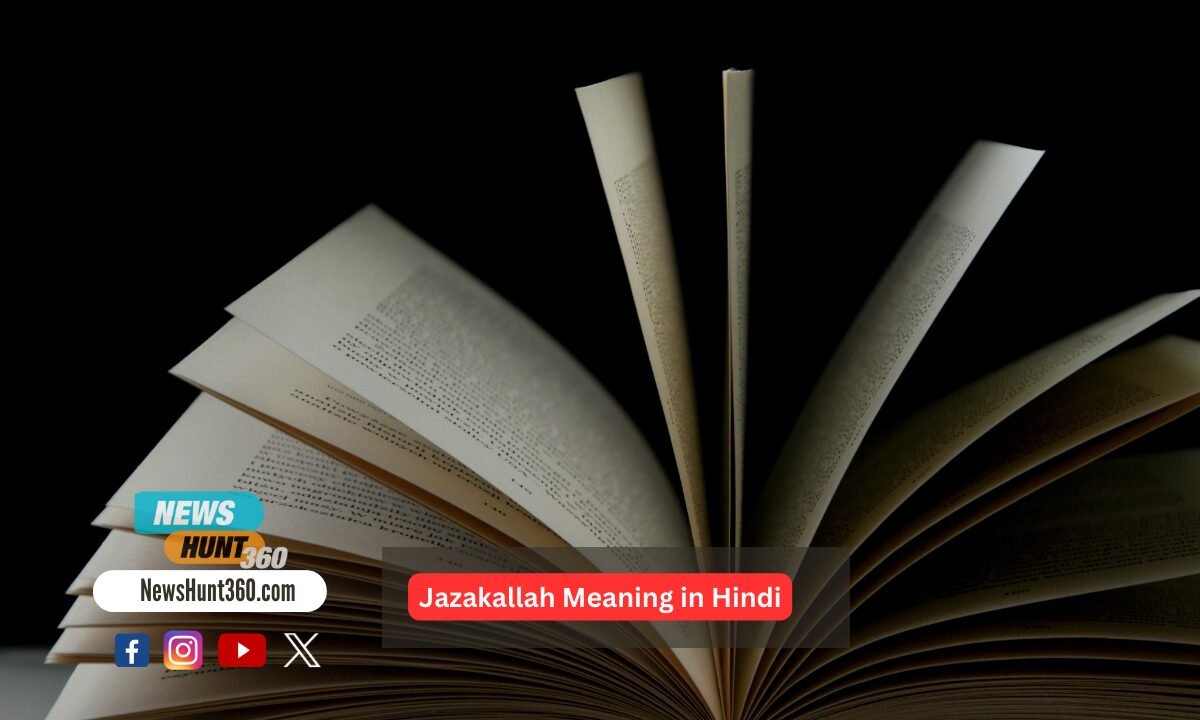Human connection thrives on the golden thread of gratitude. It acknowledges acts of kindness, strengthens bonds, and fosters a spirit of appreciation. In the vast and vibrant tapestry of Islamic culture, “Jazakallah” shines as a beautiful expression of thanks. Understanding its meaning unlocks a deeper appreciation for Muslim communities and the importance they place on gratitude.
This guide delves into the world of Jazakallah, meticulously exploring its origin, the nuances of its meaning in various contexts, and the most fitting responses. We’ll also unveil the jazakallah meaning in Hindi, bridging the language gap and fostering stronger connections with Muslim speakers across borders.
Contents
Jazakallah Meaning in Hindi
Jazakallah (جزاك الله) is an Arabic phrase that literally translates to “May Allah reward you.” It’s a heartfelt expression of thanks used in diverse situations to acknowledge someone’s good deeds, generosity, or kind words. Let’s dissect the components of this phrase to gain a deeper understanding:
- Jazak (جزاك): This originates from the verb “Jazaa” (جازى), which carries the meaning of “to reward” or “to recompense.”
- Allah (الله): The Arabic word for God, the ultimate source of all blessings.
- Ka (ك): This particle adds emphasis and translates to “you” in this context.
Therefore, when you say Jazakallah, you’re essentially invoking divine blessings upon the recipient. You’re wishing them reward from God for their positive actions towards you.
The true beauty of Jazakallah lies in its versatility. While the literal translation remains “May Allah reward you,” the sentiment behind it can adapt depending on the context. Here are some common scenarios where Jazakallah is used:
- Expressing Gratitude: This is the most common use. When someone helps you, offers a gift, or performs an act of kindness, saying Jazakallah shows your sincere appreciation.
- Acknowledging Good Deeds: Jazakallah can be used to appreciate someone’s positive actions, even if they weren’t directly aimed at you. For instance, you might say Jazakallah to someone who volunteers in their community or donates to charity.
- Appreciating Hospitality: When someone offers you food, shelter, or simply good company, Jazakallah expresses your thankfulness for their hospitality.
- Responding to Well Wishes: If someone congratulates you, offers condolences, or prays for your well-being, Jazakallah acknowledges their kind words and intentions.
Understanding Jazakallah in Hindi, spoken by a significant portion of the Muslim world, can further enrich its meaning. Here’s how the phrase translates:
- Jzaakallaah (जज़ाकल्लाह): This is the transliteration of the Arabic word “Jazakallah” into Hindi.
- Khair (खैर): This word can be added after Jazakallah to express a wish for good or blessings in both worlds (this world and the hereafter). So, “Jazakallahu Khairan” (جزاك الله خيرا) translates to “May Allah reward you with good.”
Knowing this Hindi translation allows you to show gratitude in a way that deeply resonates with Hindi-speaking Muslims.
The Art of Responding to Jazakallah: What to Say Back
When someone expresses their thanks with Jazakallah, the appropriate response depends on the situation. Here are some common options along with their meanings:
- Wa Iyakum (وإياكم): This translates to “And you as well” and is a simple yet polite way to acknowledge their gratitude.
- Afwan (عفوا): Meaning “You’re welcome” or “No problem,” this response downplays the need for thanks.
- La Shukra Alaihi (لا شكر علي): This translates to “There is no thanks upon me” and emphasizes that the good deed was done for the sake of God, not for thanks.
- Yaa Hajar Allahu Fikum (جزاكم الله خيرا): This translates to “May Allah reward you with good as well” and returns the well wishes.
It’s important to choose a response that feels natural and respectful in the specific context.
Jazakallah in Action: Everyday Examples and Cultural Significance
Now that we’ve explored the meaning and usage of Jazakallah, let’s see it come alive in some everyday scenarios, highlighting its cultural significance:
- At the Grocery Store: You’re struggling to reach something on a high shelf, and a kind stranger helps you out. A simple “Jazakallah” acknowledges their assistance and expresses your appreciation for their helpfulness.
- Helping a Neighbor: You offer to mow your neighbor’s lawn while they’re away. Their grateful response of “Jazakallah Khairan” expresses their appreciation for your generosity and reinforces the sense of community.
- Receiving a Gift: A friend brings you a thoughtful gift for your birthday. Saying “Jazakallah” shows your thanks for their remembrance and strengthens your bond.
- Sharing a Meal: You’re invited to a delicious dinner party. As you leave, expressing “Jazakallah for the lovely hospitality” shows your gratitude for the host’s efforts and acknowledges the time and care they put into the meal.
- Offering Condolences: A friend loses a loved one. You offer your condolences and say “Jazakallah” in recognition of their difficult time. It acknowledges their grief and expresses your empathy.
These are just a few examples, and Jazakallah can be used in countless situations to express thankfulness and strengthen social bonds within Muslim communities.
The Cultural Significance of Jazakallah
Jazakallah is more than just a phrase; it’s a cultural cornerstone that reflects the Islamic emphasis on gratitude, kindness, and community. Here’s how it holds significance:
- Promotes a Culture of Appreciation: By encouraging the expression of thanks, Jazakallah fosters a culture where good deeds are acknowledged and valued. It reinforces positive behavior and strengthens social bonds.
- Strengthens Social Bonds: Expressing gratitude builds bridges and strengthens relationships within the community. Jazakallah creates a sense of mutual respect and appreciation, fostering a strong social network.
- Shifts Focus to Divine Reward: Jazakallah reminds Muslims that true reward ultimately comes from God, encouraging good deeds for the sake of Allah, not just for earthly recognition. It cultivates a sense of selflessness and reinforces their faith.
- Universality of Gratitude: Though rooted in Islamic tradition, the concept of gratitude expressed through Jazakallah resonates with people of all faiths and backgrounds. It transcends religious boundaries and acknowledges the importance of appreciating kindness.
Understanding the cultural significance of Jazakallah deepens your appreciation for its role in Muslim communities and the importance of expressing gratitude in everyday life.
Beyond Jazakallah: Exploring Other Islamic Expressions of Gratitude
While Jazakallah is widely used, there are other beautiful ways to express gratitude in Islamic tradition. Here are a few examples to expand your vocabulary:
- Alhamdulillah (الحمد لله): This translates to “All praise is due to Allah” and expresses general thankfulness to God for all blessings, big or small. It cultivates an attitude of contentment and appreciation for everything in life.
- Shukran (شكرا): This is an Arabic word meaning “thank you” and can be used in more informal settings. It’s a versatile term for expressing gratitude in everyday situations.
- Jazak Allahu Ahsan (جزاك الله احسن): Meaning “May Allah reward you with the best,” this expression conveys a deeper level of gratitude. It’s used for acts of exceptional kindness or generosity.
Exploring these alternatives broadens your vocabulary and allows you to tailor your expression of thanks to the specific situation, demonstrating a deeper understanding of Islamic culture.
FAQs
What does “Jazakallah” mean?
“Jazakallah” is a way of saying thank you in Arabic. It means “May Allah reward you” or “May Allah give you something good.”
How do you say “Jazakallah” in Hindi?
In Hindi, “Jazakallah” is said as “आपको आल्लाह बदला दे,” which also means “May Allah give you something good.”
When do people use “Jazakallah”?
People use “Jazakallah” when they want to thank someone or show appreciation for something nice they’ve done. It’s a way of saying thank you with a special wish for good things to happen.
Is “Jazakallah” only for Muslims?
While “Jazakallah” is commonly used by Muslims, people from other backgrounds can also use it to express gratitude and good wishes.
Can “Jazakallah” be used for small favors?
Yes, “Jazakallah” can be used for any kind act, big or small. It’s a way of showing appreciation and spreading kindness in everyday interactions.
Conclusion
“Jazakallah” is more than just a phrase; it’s a way of showing gratitude, believing in goodness, and bringing people together. Whether in Arabic or Hindi, its message of thanks and well-wishes is understood and cherished by many. By using “Jazakallah” in our daily lives, we spread kindness and build stronger bonds with those around us, making our world a brighter and more loving place for everyone.




